Visiting Jesus in Hebron: Looking for Issa Amro
Also titled: An impossible journey to visit a nonviolent activist, who answers these (and other) questions: How should we vote this November? And why do you look for the living among the dead?
Why look for the living among the dead? Because sometimes the living are imprisoned amongst the tombs. That is where I found Jesus in Hebron. He was not at Abraham’s tomb or walking down the street with an AK-47 strapped to his back. He was jailed in his own house, refusing to leave, refusing to choose an easier path. Compassion compelled him to remain with his vulnerable neighbors, even unto death.
Issa Amro (whose name in Arabic means Jesus Strong/Resilient) lives inside an ideological Israeli settlement that was built up around his home in the old city of Hebron, where Abraham is buried. He is well known for his nonviolent activism defending his community, and was recently identified by the New York Times as the Palestinian Gandhi. Despite my many visits to Hebron in the past, I had never had the opportunity to sit with Issa Amro in his home and I was very much looking forward to meeting him with our delegation.
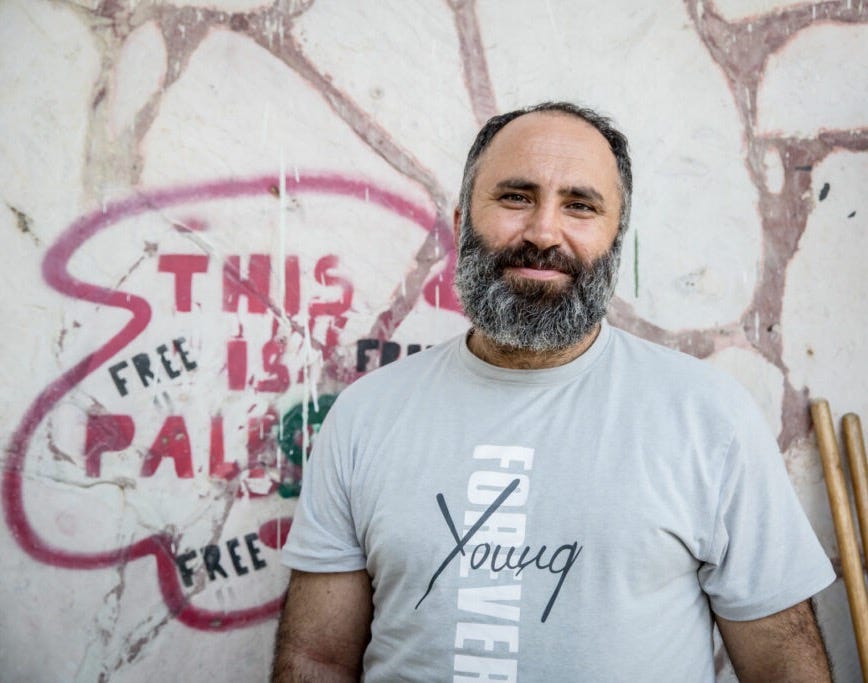
But before I begin, I must offer some background for those unfamiliar with the area: Hebron is a very strange place, more than I can explain here. (If you don’t know about Hebron, please read Rick Steve’s comments for a neutral explainer, and this report (under 5 min) for a closer look since Oct 7. If you want to go deeper, this explainer of how the apartheid system works in Hebron is very helpful).
For example: In Issa’s neighborhood-cum-settlement, Palestinians are not allowed to walk on the main street in front of their homes, but must exit their back doors or windows. And the only way they can enter or exit their neighborhood is through an Israeli-controlled checkpoint.
It is at this checkpoint where our story begins.
-—-
Omar Haramy, our intrepid leader with Sabeel Jerusalem, laughs and motions towards the checkpoint with its stalls and cameras and booths: “Here is a beautiful entrance for a beautiful old historic city!” Like so many Palestinians, Omar keeps his spirits up by finding humor wherever he can.
He points to the roadblocks in front of the checkpoint. “Remember the cover of Naim Ateek’s book with the little girl skipping over these blocks? We wanted to show an image that subverts the powers. Someday these roadblocks will be part of the archaeological excavations of the ruins of another empire. Empires come and go but the meek will inherit the earth.”
We approach the checkpoint. The voice of an unseen soldier comes through a speaker informing us that the checkpoint is closed.
Omar presses the soldier with dignity, inviting him to come out so that we can talk face-to-face, “like human beings.”
The disembodied voice tells us that the closure is a government decision. He advises us to try the other checkpoint.
We walk through an unsavory street in the old city, stinking of butchers and chickens crammed in crowded cages as we make our way to the other checkpoint. When we enter the half-empty market, half-slumbering shopkeepers rouse themselves. We are surely the only foreign group the locals have seen in months. We ignore their pleas to shop – we have an appointment with Issa and we are running late.
After we pass through the other checkpoint next to the church-turned-mosque-turned-church-turned-mosque-turned half-mosque-half-synagogue where Abraham and his family are buried, we proceed towards Issa’s home at the far end of the settlement area. We only get a few feet before we are stopped by a roadblock and Israeli soldier who tells us that we are not allowed to go any further. It is for our own protection, he says. It is Shabbat and the settlers will beat us up if they see us. (All the observant Jews I know will not even flip a light switch on Shabbat, but beating up people like us is apparently a lawful Shabbat activity for the devout of Hebron).
Omar is nothing if not persistent. He picks two older members of our delegation, (one with a cane) and they try to reason with the soldier.
The rest of us wait in front of the silent mosque. There is no one in sight except soldiers. The area is eerier and emptier than I have ever seen it.
Omar returns with bad news: We cannot enter the neighborhood this way. He was warned that even some of the soldiers might beat us up if they see us inside the area. We exit the checkpoint and return to the depressed old city market.
After being twice rebuffed, we feel more determined than ever to meet with Issa—but how? Should Issa come out to meet with us? If he does, he will not be allowed back through the checkpoint to his house till 10 pm, after Shabbat is over.
Omar suggests that we spread out and shop a bit while we figure out Plan B.
There is a teenaged kid following us, peach fuzz on his upper lip. He’s selling little bracelets that say “Palestine” and other knick-knacks. He is unrelenting, walking with us and talking nonstop: “Please, the situation very difficult. Please buy something, support Palestine. The situation very difficult. Please, to help us. It is very difficult. Good deal, good deal.” After Omar points out that the boy is like the persistent widow, we stop to talk to him. His name is Mohammad. He also lives in the midst of the settlement and won’t be able to get home till after 10 pm tonight, when the checkpoint opens back up. (Sometimes the checkpoint does not open back up and he must find another place to sleep in the old city). He was born on Shuhada street. This is his life; it is all he knows.
He tells us that since Oct 7, he has been repeatedly assaulted by the settlers who handcuffed him and and beat him. The settlers even brought their children (boys) to beat him up. Fathers and sons urinated together on him. They stole his Palestine bracelets and other merchandise and burned it.
While we talk with Mohammad, Omar is exploring options. He learns about another way to access Issa’s home. It is through a Muslim graveyard, leading to Issa’s back door.
We drive up a hill and park the mini-bus in front of the graveyard. We’ve come to look for the living among the dead, whispers someone in our group.
“We will walk quietly,” says Omar. “Like zombies. No talking. Walk in single file. Just follow me and don’t stop for any reason until we get to Issa’s house.”
We make our way through the tombs surrounded by yellow grasses and trees, the hot sun blazing overhead. Omar is in the front, and I am near the rear.
As we ascend a hill to Issa’s house, we pass an underground room (perhaps an ancient tomb for someone of note?) with stone steps descending below. I am startled to suddenly hear anguished male screams emitting from it, along with male voices and faint laughter.
I want to stop. But the group continues moving, single file, silently, up the hill.
I wish we had not just had a discussion in the bus about the torture at Sde Teiman, and other Israeli prisons. I wish we had not just heard Mohammad’s story. I wish I didn’t know what Issa suffered on Oct 7 at the hands of the settlers.
My heart pounds. Tears prick my eyes. My conscience is burning. In all my experience in Palestine/Israel, I have never seen this. I cannot believe I am still walking, like a zombie, away from the screams. Levi (who went to Basic Training with Aaron Bushnell and wrote about him here) is in front of me. We clasp hands, silently squeezing them for comfort as we continue. I whisper-pray under my breath, “Lord have mercy, Christ have mercy.” I don’t know what else to do. The sun is beating on my head, I feel a little dizzy and it is hard to breathe.
We come to Issa’s heavily-gated yard where outdoor seating is arranged under olive trees. He’s been waiting a long time for us.
What was that scream? Did you hear it? I query Omar. He had not heard it. He thinks it was Israeli settlers or soldiers trying to scare or trap us. He tells me not to worry about it.
Omar knows the situation better than I do, and I trust him, but I find it hard to calm myself. What if he is wrong? I settle in the shade to listen to Issa, my heart still pounding.
Issa unburdens his heart to our delegation:
“We woke up this morning and found that the checkpoints are closed. This happens all the time now. After Oct 7, they added many new layers of restrictions and obstacles. All the Palestinian families that live in this area are stuck. We are isolated and terrified. Settler militias are now acting as the government, and they are backed up by their government. I’m caged here in my own home because of settler and army violence. It was bad in the past, but now it is crazy. We have no services such as doctors, electricians or plumbers. Yesterday, we called the ambulance to take my father to the hospital. He takes it from time to time, he’s sick. After two hours and intervention from the Red Cross, the ambulance was still not allowed to enter. So, we carried him through the checkpoint.
“Five weeks ago, our neighbor needed an ambulance. She’s an old woman who fell and broke her head. Her family called the ambulance at 11:49 am. After 1.5 hours, they called me to help – the ambulance had not arrived. I made noise at checkpoint and called friends. Finally, at 2:15 pm the ambulance arrived. Normally, the ambulance is only 2 minutes away!”
Issa told us that after the ambulance arrived, there was a disagreement among the Israeli soldiers and militias. Some were refusing the ambulance entry, and others disagreed, arguing that it had all been coordinated and approved. Finally, the ambulance entered the neighborhood and picked up the woman, but to no avail. The soldiers refused to allow it to exit. They said the checkpoint was closed.
“And the woman who did not get the ambulance? Her family protected Jews during the massacre of 1929. Her brother was a milk baby with a Jewish woman. Even the rabbis are being attacked. Arik Asherman (of Rabbis for Human Rights) attacked yesterday.”
Omar interjected at this point, wanting to encourage Issa and wanting our group to know how special he is—how he has hosted visitors ranging from Anthony Blinken to Bernie Sanders. How he has tirelessly explained the plight of Palestinians to anyone who will listen. “My friend, you are a symbol of resistance and nonviolence. You have the courage to do what needs to be done even though you have been arrested and attacked so many times. The settlers want to make an example of you, but you refuse to be quiet. Your work will be documented in history. We are here for you. The more they attack you, the closer we will come to you. We refuse to leave you alone. We need you and love you.”
Issa was visibly moved by Omar’s encouragement. “Sometimes we feel disconnected,” he confessed. “Since Oct 7, we have no social life, no visitors. Even locals are afraid to visit me, because I am monitored by the settlers. One local friend who visited was detained at the checkpoint when he left. They knew he had been here with me.
“When it gets hard, many people disappear. I am working very hard to keep the families in their homes. This is my nonviolent activism. But without international support, I cannot do this work. The fact that you insisted to visit me today is such a blessing.
“They want us to die in silence, leave in silence,” he continued. “They don’t see us as humans. For the first time they are saying it publicly. They don’t see us as a nation that wants freedom and equality. They see us as animals. A man was detained at 1 am last night and tortured. Then another, and another. Three people in a row were detained at the checkpoint. The soldier was just doing it on his own. I want you to understand – it is not just Ben Gvir. This is a system. It was created to evict Palestinians.
“But in one way I feel encouraged. In spite of the terrible situation in Gaza, we are achieving a lot. Before, we were dying in silence, but now the world is paying attention. Politicians know now that Israel is not a democracy. Israel is now labeled as war criminals who are committing apartheid and genocide. You don’t even starve animals, but they are starving children and women in Gaza. I see them as weak. Their strength comes from the outside, from the western countries. But I believe we are at the beginning of a change. The right time to act is now. We need to act when situation is hard.
“We don’t want to harm anyone. We don’t want to kill the Jews. We just want our freedom. I don’t judge anyone by their religion. This is a holy land for everyone. I judge you as a human being by how you live and how you treat people. According to your actions you will be judged by God. This is what I believe.
“A few days ago, a soldier said to me, ‘I am waiting for you to make a mistake so I can kill you.’ I don’t believe that they can kill me without God’s permission. I don’t want to die, but I must stay here and continue this work. I will not give up. We are too close now to ending the occupation.”
As our time is winding to a close, Issa says something that surprises many of us: “We want Kamala Harris to win the election. If Trump comes into office, this land will be officially annexed, and they will drive all of us out.”
Some in the group object. Kamala is part of the Biden Administration, which has paid for and enabled the war on Gaza. How can we vote for her? Some in our group advocate for a third party instead of Kamala.
Issa is dogged on this point. “We don’t have expectations for the American government to change. It is what it is. But if Trump is in office, we will be completely suffocated. It will be the end of us. Kamala may not be a hero, but she is better than Trump. If she is in office, we will still be able to breathe a little bit. This is our strategy, to continue breathing until the real change comes.”
I know I was not the only one pondering his words as we walked back through the cemetery, single file, like zombies. (I was relieved that the underground room seemed empty as we passed it).
Our group discussed Issa’s words over the next few days. The purists among us were skeptical. The pragmatists were supportive. I swang back and forth, seeing both arguments. I did a little research and discovered some of his reasoning: Hebron settlers are particularly supportive of Trump. Miriam Adelson, a big supporter of West Bank settlements and annexation is pledging millions to Trump’s reelection campaign. (Polls show that the majority of American Jews are voting blue, as usual).
If the settler movement wants Trump this badly, maybe Issa is right.
After our delegation returned to the USA, Kamala accepted the Democratic nomination for president. She refused to allow a Palestinian-American Democrat to even have one minute to address the convention. She pledged unwavering support for Israel to defend itself and for America to continue its empire with unsurpassed military strength. (That is how I heard her words).
I was deeply disappointed.
After her debate with Trump, a few weeks later, I decided to text Issa. I wanted to know: in light of all that Kamala has done since we saw him, did he still want us to vote for her?
Yes, he said. It will be a disaster for us if Trump wins.
Issa had just been detained and interrogated by Israeli intelligence the day before. He said it has been a very hard week for him. He was raw, but still holding his ground. He said he would later release a video outlining his reasons for asking us to vote for Kamala.
I share this because I feel Issa has earned the right for his views to be taken seriously by US voters who care about Palestinian rights. Please do with it as you will. As for me, this is not a political endorsement. Everyone must follow their own conscience and I would never want to infringe upon that.
All I know for sure is that I have an obligation to share what I saw and heard in Hebron. I want this occupation to come to an end. I want both Palestinians and Israelis to live in peace and freedom. I want my government to stop empowering this dysfunction.
And I want Issa to keep breathing.
—
Why look for the living among the dead? Because the living hold back the plague of death amidst death—and they must be willing to die while doing it. This is what I learned from Issa Amro, a Muslim man, well-named.
P.S. I wondered if it would be safe for Omar Haramy if I shared this story. I wrote him to ask if he wanted me to omit details or use a pseudonym for him. This is his response: Yes, say my name and say that I will continue this work because I take my faith seriously and I am following Jesus and there is no turning back. Jesus asks us to be with the people, and that is my plan.
Then he added one more text:
The kingdom of God is here.




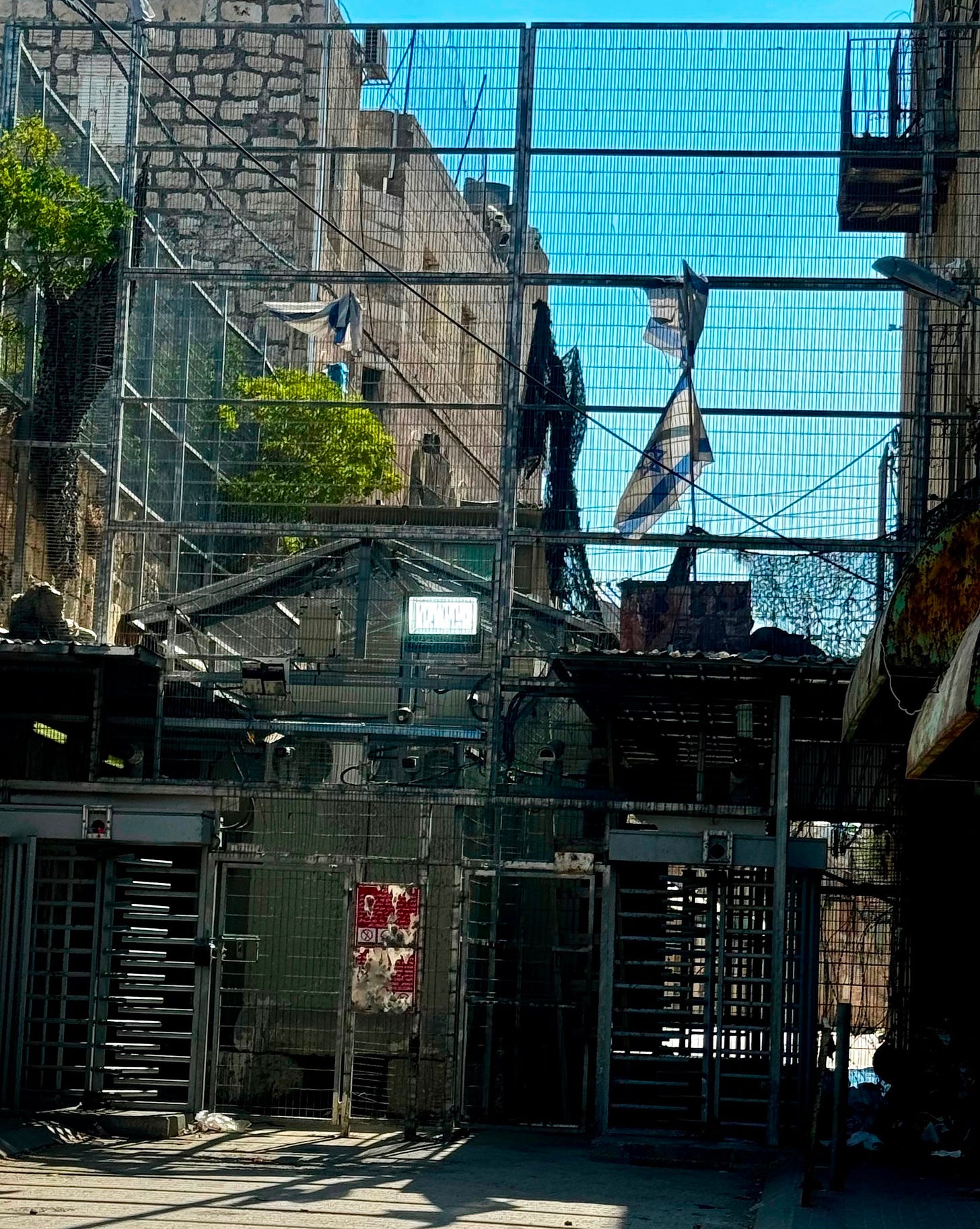
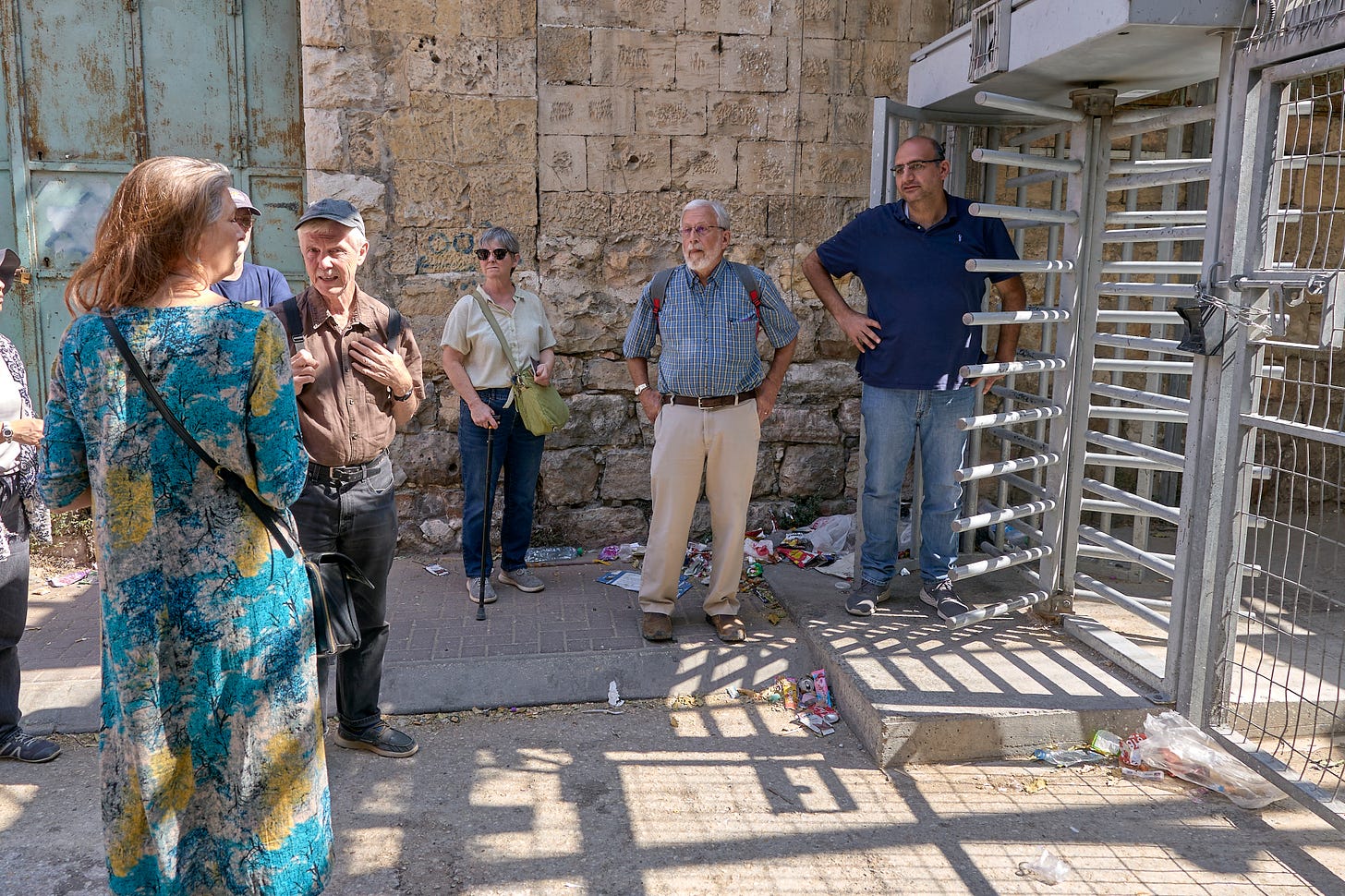
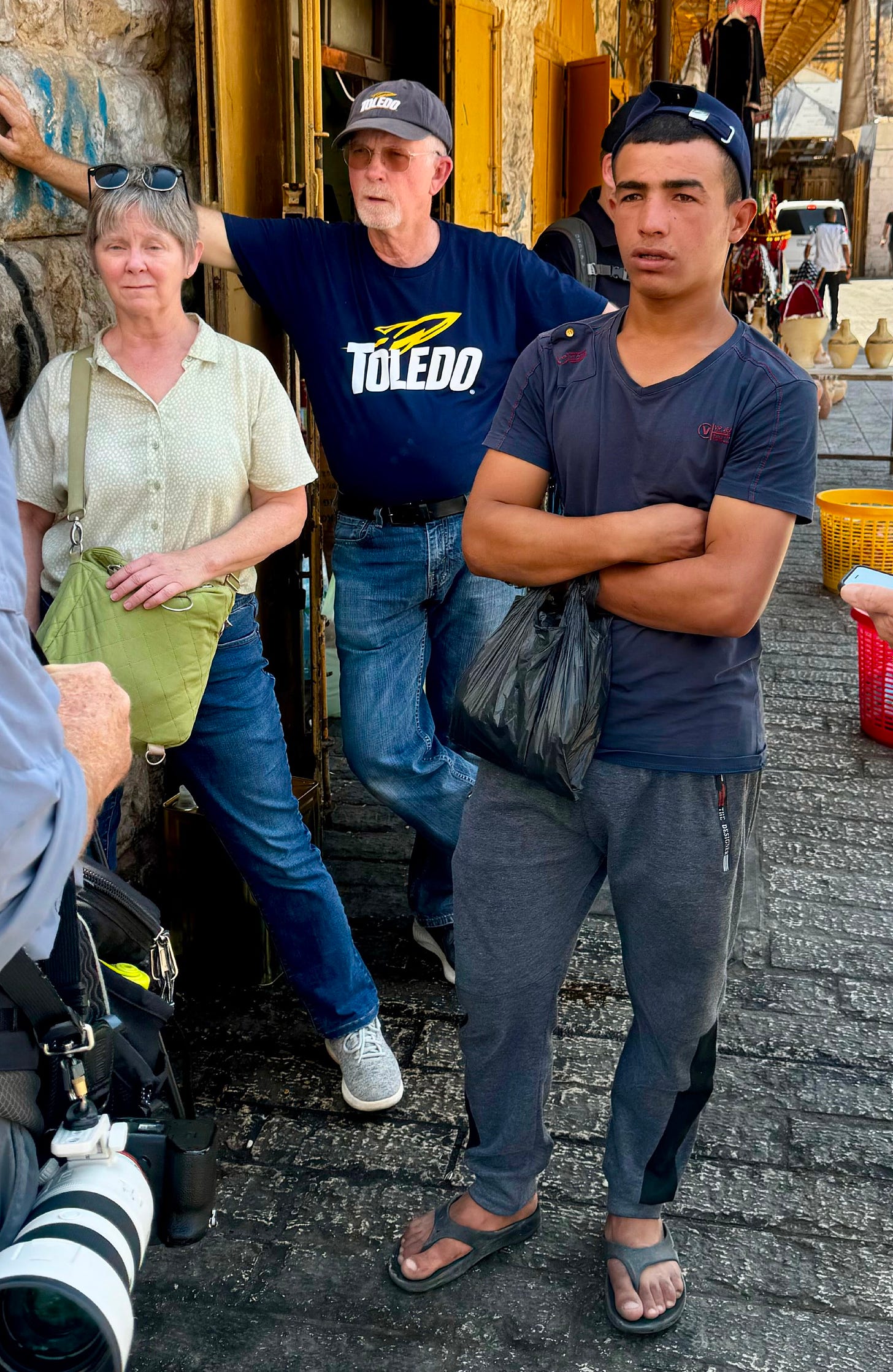
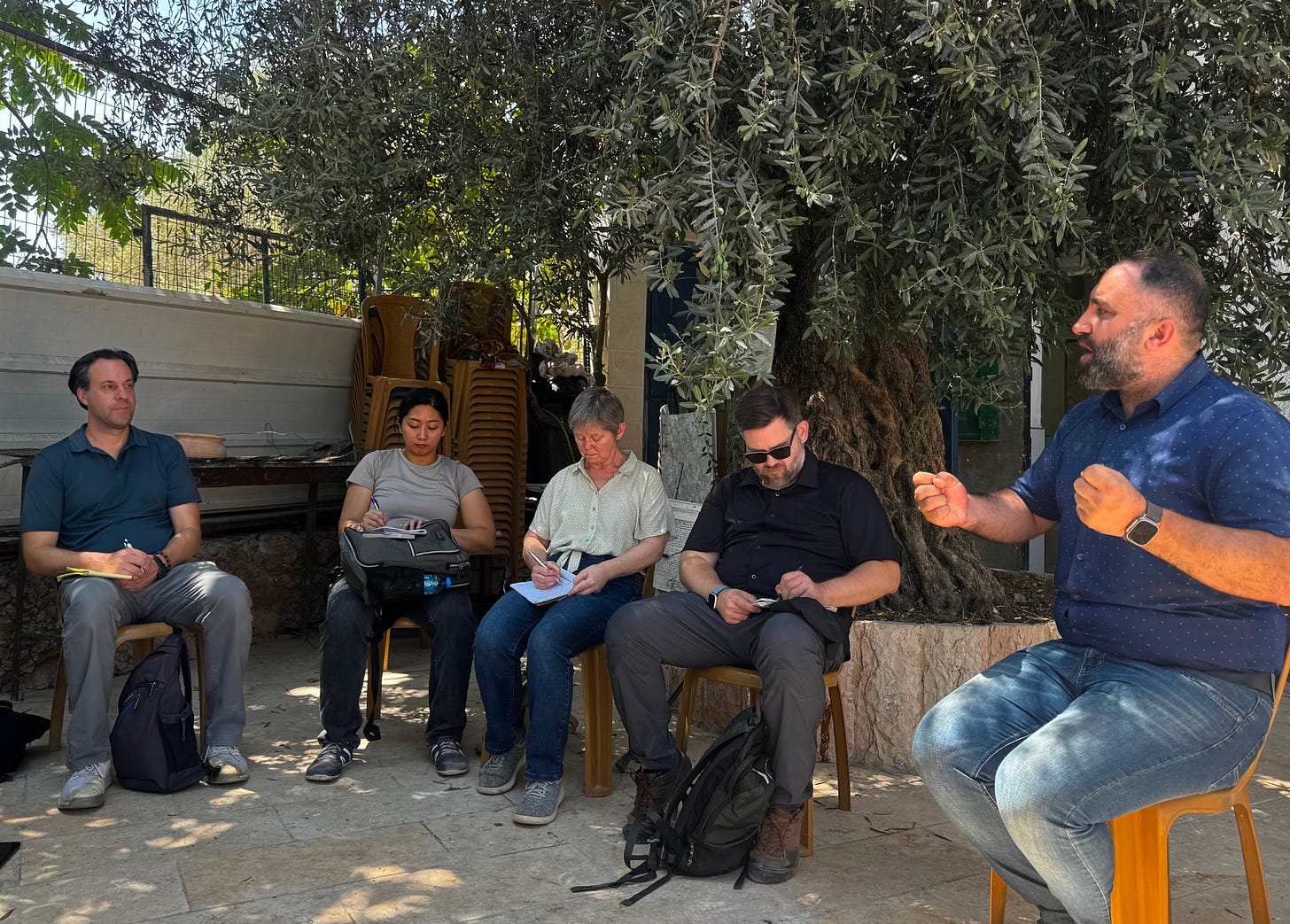
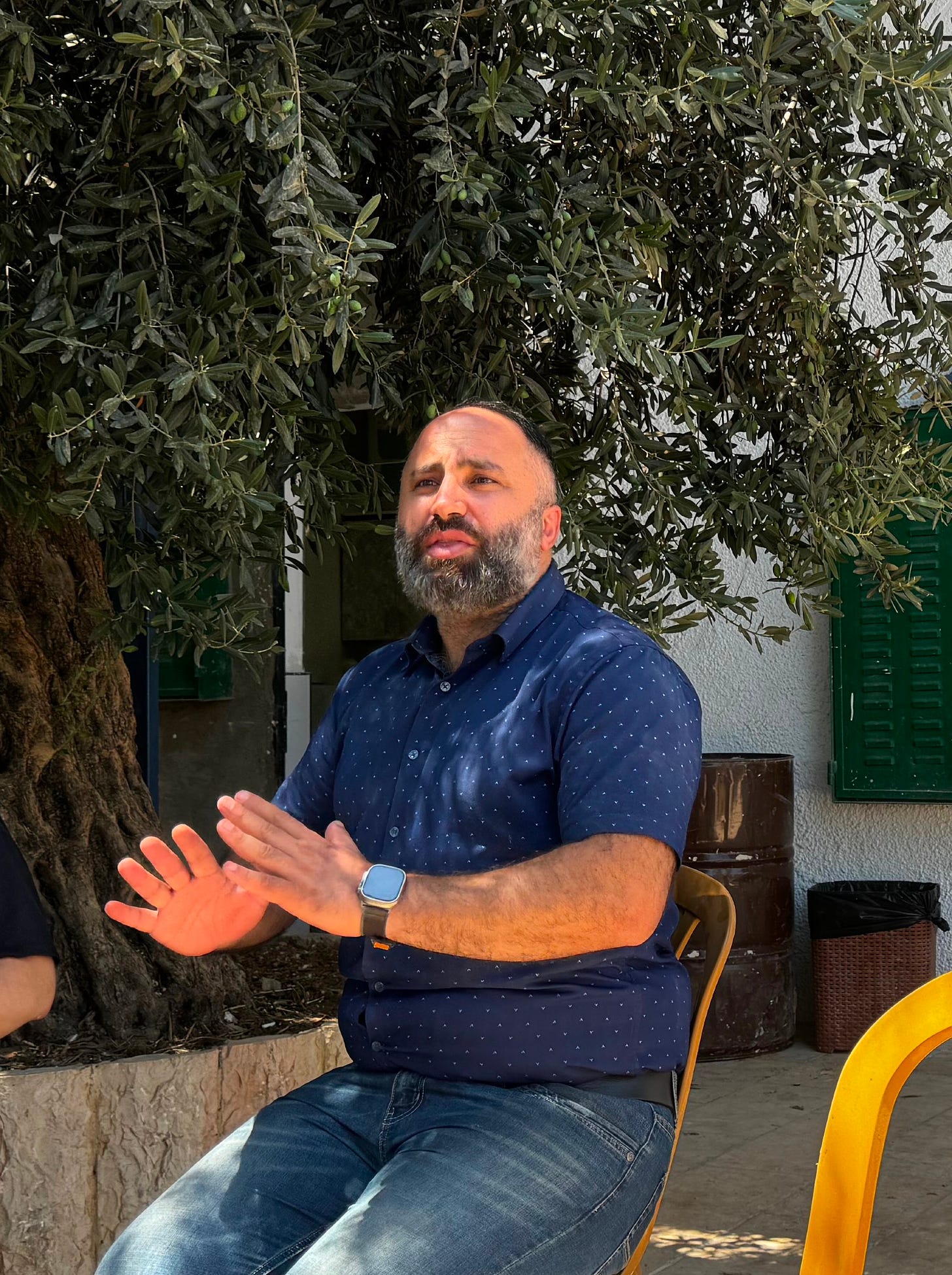
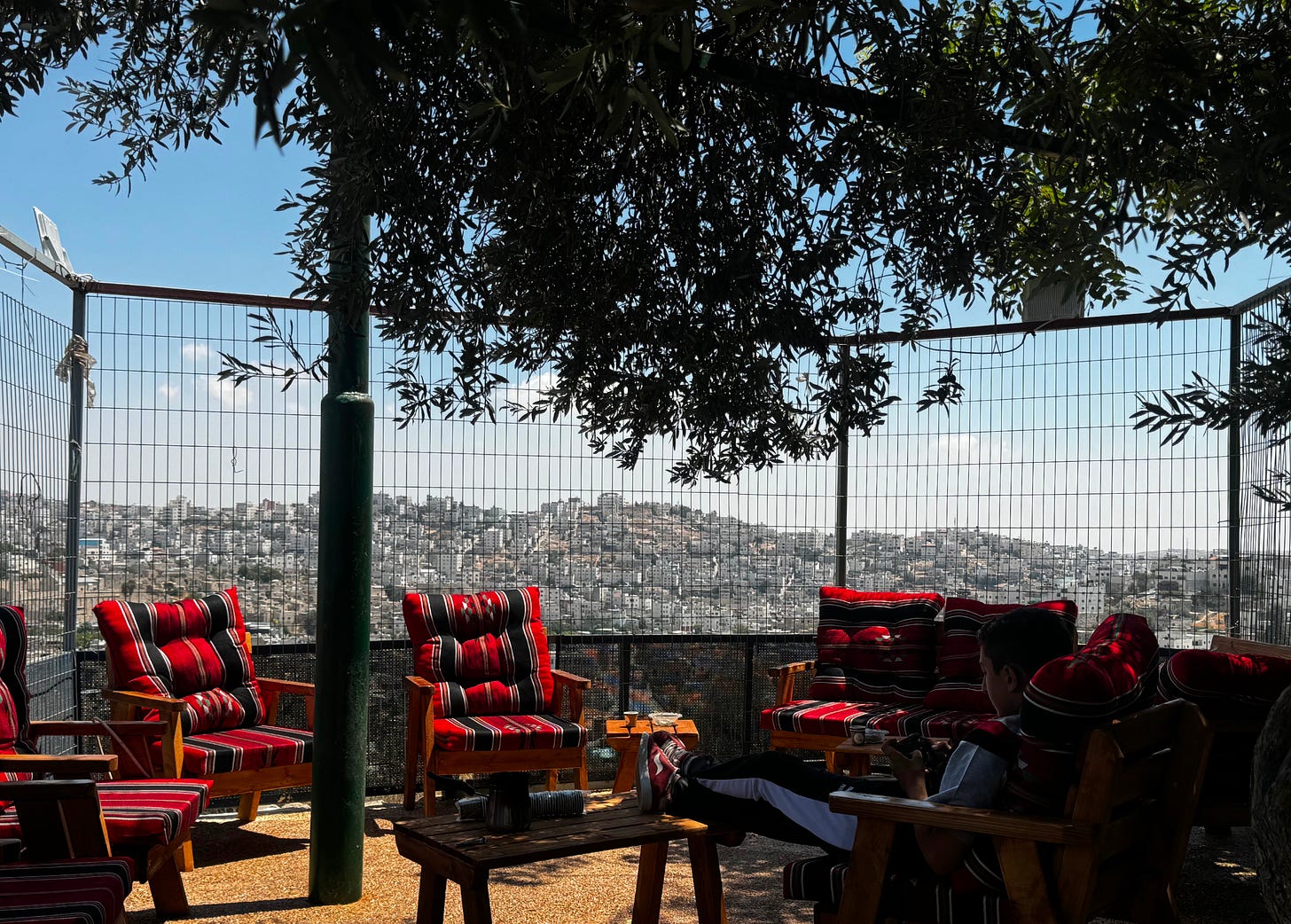
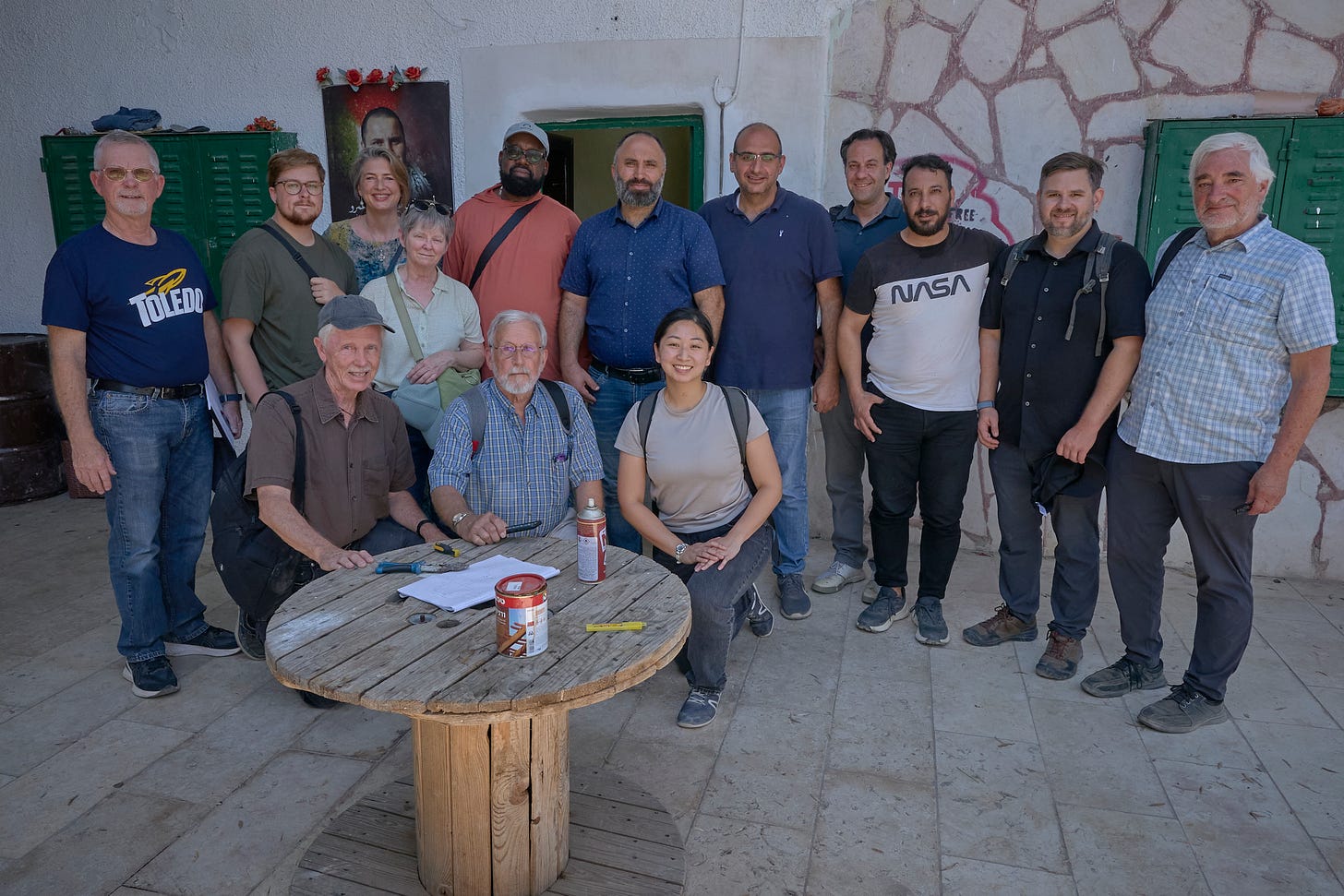
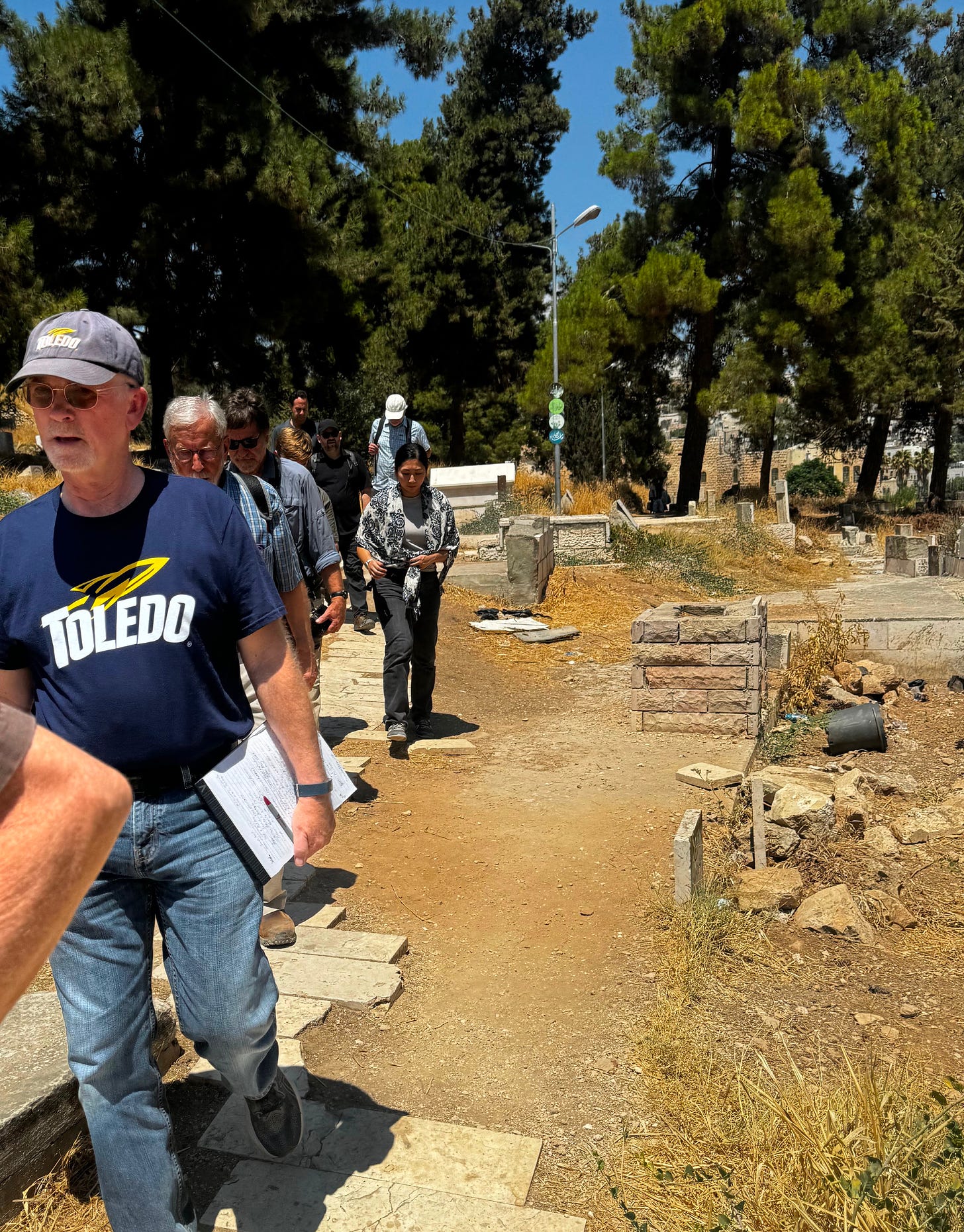
It takes a heck of a lot of hutzpah to get over our fears.
So thank you for honestly sharing how you and your fellow traveller's chose to get over your own fears in order to bear witness to the plight of Issa and his neighbours in Hebron — along with everyone else across that troubled land.
At first I wanted to cry aloud “Blessed are they who come in the name of the Lord” in response to those who choose to make a stand for justice. But I didn’t want to cry it in a triumphal way.
Immediately I felt drawn to read Ecclesiastes 7:2-3
“It is better to go to a house of mourning than to go to a house of feasting.
Sorrow is better than laughter, for a sad countenance is good for the heart”
Hidden within these agonising words lay another word — ‘Splagchnizomai’
A Greek term, which literally means “A Bowel Wrenching Act!’
From here we get our not so descriptive English word — ‘compassion.
However painful this ongoing journey might be… Please, please be encouraged to keep on carrying whatever it is ‘He’ would give you to carry. Because you folks represent trustworthy waymarkers for those stumbling around behind you..in the foothills of which way to go …🕊️
Now I’m feeling all of the confliction you and your party went through, hearing Issa’s convictions on a vote for Harris. He’s making me take pause; I’ve been planning a third party (write in) vote this whole time.
I didn’t love it, when Vladimir Putin endorsed Kamala Harris a few weeks ago…